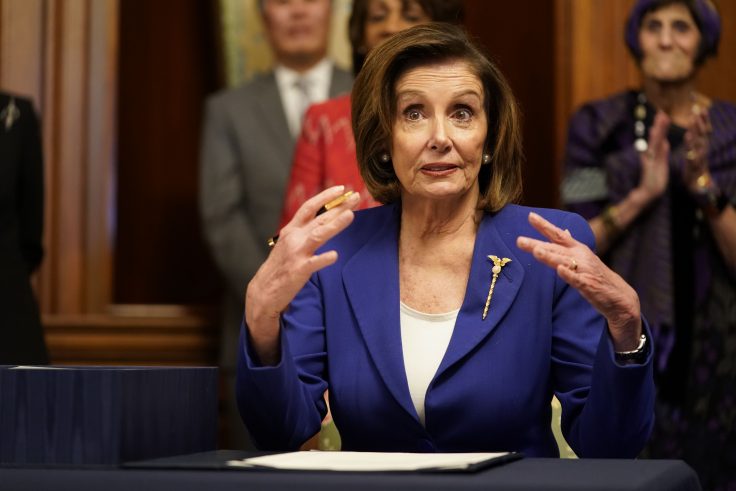Speaker of the House Nancy Pelosi (D., Calif.) said Monday that she would like to see the next coronavirus stimulus bill include provisions that would hand millions of dollars to the super-wealthy.
Pelosi told the New York Times in an interview that, as part of the next round of fiscal stimulus, she would like to "retroactively undo SALT," referring to the 2017 Tax Cuts and Jobs Act's capping of the federal deductibility of state and local taxes at $10,000. The "undoing" would apply retroactively for 2018 and 2019, although a Pelosi spokesman told the Times that it would be "tailored to focus on middle-class earners and include limitations on the higher end."
Repealing the SALT cap has been a major goal for representatives from states with high taxes, especially Democratic strongholds like New York, New Jersey, Illinois, and Pelosi's own state, California. Pelosi's push for its repeal makes for another case of Democrats' use of the coronavirus crisis to push long-standing policy goals—in this case, a change that would give millions in tax dollars back to the ultra-wealthy.
The proposal comes as many on Capitol Hill mull a follow up to the $2 trillion coronavirus stimulus passed last week. That bill targeted aid to those most in need, giving direct cash payments to individuals making under $75,000 a year and substantially expanding federal support for unemployment insurance.
Removing the SALT cap, by contrast, would almost exclusively benefit those least in need, Joshua McCabe, a welfare policy expert and professor at Endicott College, told the Washington Free Beacon.
"There is some disagreement on the merits of the SALT deduction in general but I can't think of a single tax expert who would defend removing the current cap—especially retroactively—as a stimulus measure," McCabe said. "It's almost the exact opposite of what Congress was trying to do with the phase three rebates. Rather than provide relief to the bottom 85 percent of Americans, this proposal would shower almost all the benefits on the top 15 percent of taxpayers—those who need it least."
Data from the nonpartisan congressional Joint Committee on Taxation quantify the disparity. The committee estimates that those making $50,000 per year or less would see no effect on their tax bill, while those making as much as $200,000 to $500,000 would see a reduction of only $177 on average. Those making an annual income of $1 million or more, by contrast, would experience a savings of $58,636 on average.
This disparity is much of why Republicans pushed for the SALT cap in the 2017 TCJA. High-earning households already have much larger state and local tax bills, so they will necessarily enjoy a larger SALT credit. They are also much more likely to itemize, rather than take the standard deduction: Only about 13 percent of all taxpayers itemize, but among the top 1 percent, 9 in 10 do.
While the wealthy would benefit from a SALT cap repeal, federal revenues would take a major hit. The Tax Policy Center estimated that repealing in 2018 would have cost the federal government $620 billion in lost tax revenue over the following 10 years.
In McCabe's view, Pelosi's floating of SALT repeal reveals how she has been forced to walk a narrow line between her party's more moderate and more radical factions.
"Last week, she spent much of her time trying to please the progressive wing of the party by floating radical amendments to the relief bill," he said. "This week, she is trying to please representatives of wealthy suburbs by proposing reinstating their special tax benefits. It's not an enviable position."
Pelosi previously delayed passage of the third round of coronavirus stimulus by pushing a 1,400-page bill preoccupied more with diversity mandates and targeted subsidies than with addressing the coronavirus. Other Democrats have followed her lead—Sen. Patty Murray (D., Wash.) and Rep. Rosa DeLauro (D., Conn.) used the cover of the disease to reintroduce the same paid sick leave bill they have floated annually since 2004.
